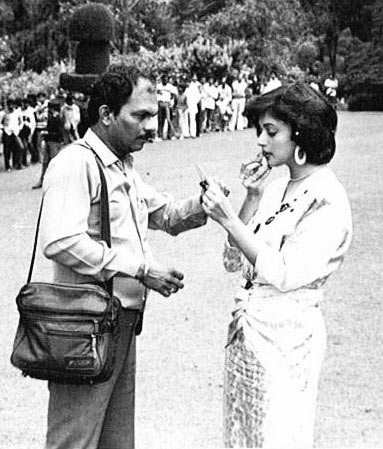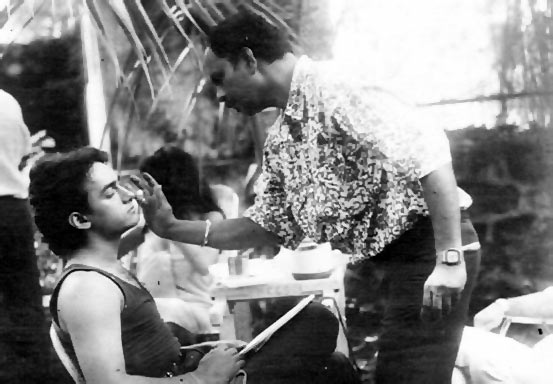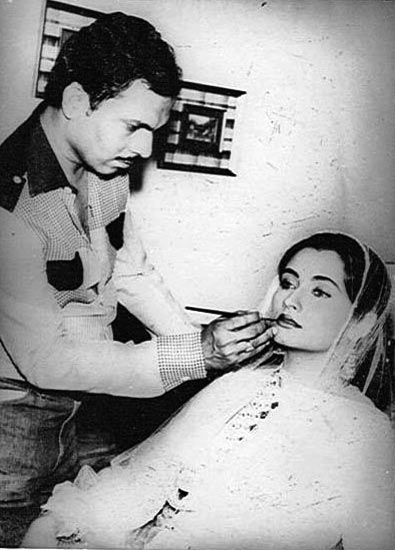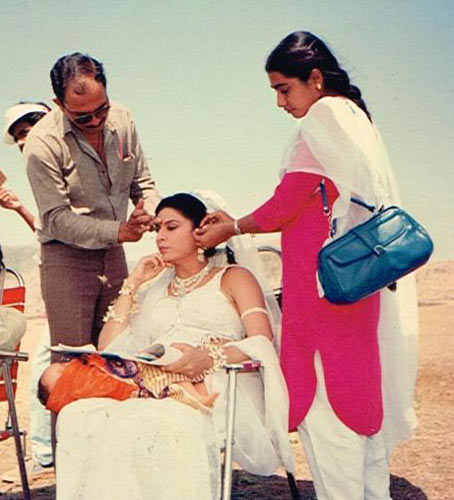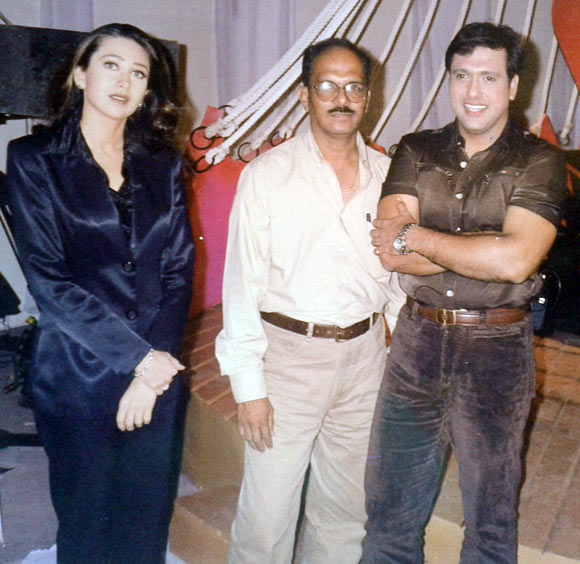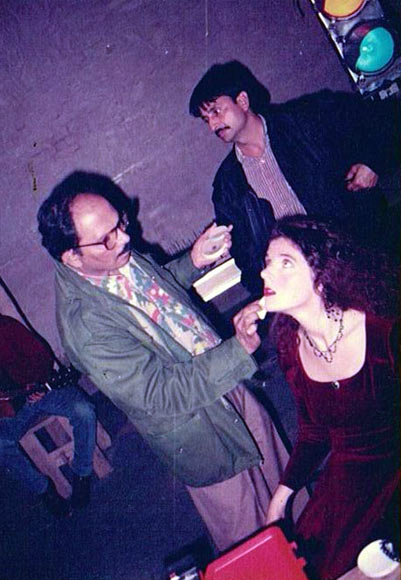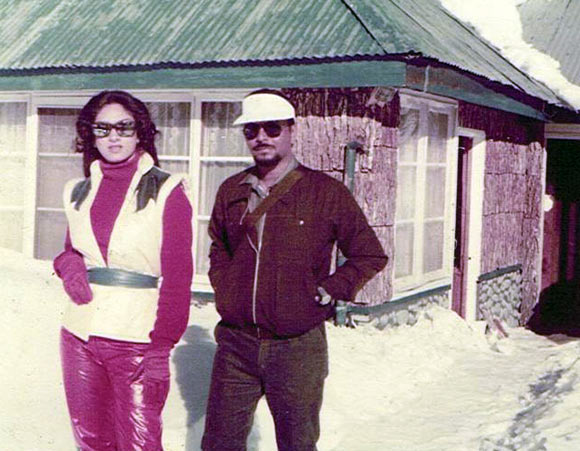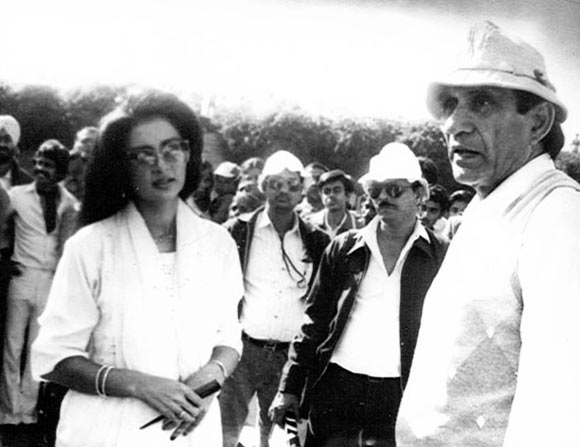 | « Back to article | Print this article |
Meet Madhuri, Aamir, Shah Rukh's make-up man
As Indian cinema turns 100, we look at the film folk who work behind the scenes, without whom moviemaking would not ever have been possible.
Make-up man Shashikant Mhatre has worked with some of the biggest movie stars, and is a treasure-trove of untold stories from behind the scenes.
Rediff.com's Nishi Tiwari met him recently.
Often, those enticing kohl-lined eyes, scarlet lips and that near-perfect hint of colour on the cheeks that makes our hearts skip a beat owe much to the hands of the brush holder -- the make-up artist who transforms good-looking people into impossibly dreamy and flawless screen gods and goddesses.
Shashikant Mhatre has practised this craft for over 40 years and has worked with some of the biggest movie stars.
When I meet him, he is preoccupied with finding a very special letter, a souvenir from a glorious past, that he may have lost while moving house a few months ago.
His ancestral home near Portuguese Church in Dadar, central Mumbai, which he shares with Sarayu, his wife of 34 years, and his extended family, is undergoing redevelopment so he has temporarily moved into an apartment close by.
The letter he is searching for is from Abigail Hopkins, the musician daughter of Sir Anthony Hopkins who he met and briefly worked with during an assignment for Zee TV in London a few years ago.
Mhatre counts his chance meeting with Abigail among one of the memorable incidents in his eventful career defined by happy accidents, a long and fruitful association with BR Films (the late filmmaker BR Chopra's production company), and challenging work on the most iconic epic saga we have witnessed on Indian television.
Here, he takes us on a magical mystery tour of the movies.
Please click Next to read more...
'The first film I worked on was Dhund'
Istarted working as an assistant to Pandhari Jhuker, who was already an established make-up artist, in 1972. He is my sister-in-law's brother.
He was working for BR Films at that time so that's where I started.
I worked as Pandharidada's assistant for the first two years. In 1974, he handed over all the work for BR Chopra projects to me. I have been working independently since. Now I freelance, but I worked exclusively for BR for most of my career.
Even today, if something from them comes along, I give them first preference.
I never planned to be in this profession, it just happened by chance. I was a polytechnic student when this opportunity came my way and I took it.
The first film I worked on (as an assistant) was Dhund. After that came Amitabh Bachchan, Saira Banu and the Shammi Kapoor starrer, Zameer.
Please click Next to read more...
'Shammi Kapoor cancelled the shoot, saying he wouldn't get his make-up done by an assistant'
During the shooting of Zameer, it so happened that Pandharidada was unavailable when we were shooting at Rajkamal Studios.
Shammi Kapoor cancelled the shoot, saying he wouldn't get his make-up done by an assistant.
Later, when the crew left for an outdoor schedule in Bangalore for the same film, Shammiji's personal make-up artist had to go home as his mother had passed away.
So I had to step in at the last minute. Left with no choice, Shammiji had to let me do his make-up for the schedule.
He was so happy with my work that he insisted that only I do his make-up in all his films thereafter.
Please click Next to read more...
'People were sceptical about my capabilities during the shooting of The Burning Train'
I have worked on many BR films including Karam, starring Rajesh Khanna, and Aaj Ki Awaz, starring Raj Babbar and Smita Patil, among others.
I remember when B R Chopra was about to start shooting The Burning Train. The script demanded some heavy duty make-up -- as the name of the film suggests, there are a lot of cuts, bruises and burning happening in the film. People were sceptical about my capabilities.
They said, "Yeh toh chhota ladka hai, yeh kya kar payega? Hum kisi bade artist ko bula lenge (he is a young boy, what can he do? We must get a big artist)."
But B R Chopra said he had faith in my work and wouldn't want anyone else to do the job.
The Burning Train turned out to be one of the best learning experiences in my career. We used a lot of prosthetics and new ways of doing make-up to show burnt skin and cuts.
Please click Next to read more...
'Salma Agha was too fair, so we had to do several tests'
I have worked a lot with Madhuri Dixit. Her skin is really good. She wanted to hire me as her personal make-up expert, but I declined.
The concept of having your personal make-up artist wasn't really popular back then. Production companies used to have make-up artists on their payroll who would work with whichever star was signed on to star in their films.
Nikaah was another standout film in my career. The film's lead actress -- Salma Agha -- was too fair, so we had to do several tests with different shades of make-up on her before shooting commenced.
Finally, Dharam Chopra, the cinematographer, approved one style to be used for the entire film. We worked really hard on her look. I won an award for the make-up in Nikaah.
It doesn't matter for us if a star has bad skin. We have to make them look good. It's easier to work with good skin; problematic skin takes a little more effort.
Please click Next to read more...
'Working on Mahabharat was very exciting'
Reena Roy had a bad acne problem around the time she starred in Gunj. It took a lot of time and effort to hide it.
Another time, when I was flown to Rome in 1989 for a Lux commercial with Meenakshi Seshadri, cameraman Varun Mukherjee and I had to work really hard to conceal pimples on her face.
After Gunj was completed, Reena Roy wanted to hire me as her personal make-up artist, but I wasn't really keen because working exclusively for one person restricts the scope to learn.
When you are working with a film company, you get to work with different skin types and learn different styles of applying make-up.
Working on Mahabharat was very exciting. We used a lot of fake moustaches, wigs and prosthetics.
B R Chopra was very thorough with his research. Look tests of actors alone took two years. He wanted even the tikkas on the characters' foreheads to be authentic so a lot of research went into that too.
I applied at least 40, 45 kinds of make-up on Nitish Bharadwaj before he was signed on (Bharadwaj played Lord Krishna).
Painter Ram Kumar and Rahi Masoom Raza (the Urdu poet who wrote the script and dialogues for Mahabharat), were involved in the exhaustive research and showed us countless sketches to get the look right.
We didn't take a single day's break for the entire course of Mahabharat. B R Chopra would direct in the morning, Ravi Chopra would take over in the afternoons and Raj Tilak, B R Chopra's son-in-law, would take over the reins for the evening shifts.
We used to shoot for 12 hours every day on an average.
Please click Next to read more...
'Nana Patekar got his break in films on my recommendation'
I was the first make-up artist for Govinda, before he made it big in films. He featured in a documentary on fertilisers that was produced by BR Films. He remembers even today that I was the first make-up man he worked with.
Nana Patekar got his break in films with Aaj Ki Awaz on my recommendation.
We were discussing the cast for the film when Chopraji asked if I knew a new actor they could cast.
I'd heard about Nana from my friends. His play Purush had become really popular those days.
I didn't know Nana, but I knew his parents. Their Ganpati celebrations were famous -- people would come from faraway places to see the elaborate decorations at their home.
I called his house, but he was in Nashik. He called to say how grateful he was and would meet me as soon as he got back.
When I took Nana for the audition, Ravi Chopra was very impressed with his voice and his acting. Smita Patil, who was passing by, met Nana warmly -- they'd known each other when she was active in theatre.
Please click Next to read more...
'Two years is a long time in our film industry'
In the late 1980s, my relationship with BR Films soured for a while -- and I moved away temporarily. I worked on an Italian film being shot in India.
It was titled Mystery of the Dark Jungle, and the film's director was looking for an Indian make-up artist.
After that project, I flew to London to shoot for a Zee TV show. There were people around us watching me closely as I worked. The show's coordinator approached me after a while and asked if I'd do the make-up for a British artist.
I jumped at the opportunity. The girl I worked on was so happy with my work that she asked if I lived in London and if I'd do her make-up on a regular basis!
After she left, the coordinator asked if I knew who she was. Turns out, I'd just met and worked with Abigail Hopkins, a British musician and daughter of veteran actor Anthony Hopkins.
Abigail sent me a letter, inviting me to Britain and to work with her for two years. I didn't go because I didn't want to leave my established work.
Two years is a long time in our film industry and people tend to forget who you are if you are absent for such a long time.
Please click Next to read more...
'Television serials have done a lot of harm to the art of make-up'
Some people still have a sense of aesthetics, but these television serials have done the art a lot of harm.
First, the make-up is uniformly similar in all of them. No matter how old a character is, the wig will always be black.
Also, unlike in the old days, make-up isn't done according to the scene. It doesn't matter if a character is in jail or admitted in a hospital, the make-up never changes.
Now, newer, better cosmetics have come into the market. Even the skin tone used in makeup has changed. Back then, 626-A, B, C,D (the number of shades) of MaxFactor were used for the actresses and 665-A, F, G shades for the actors. Brownish make-up has now given way to a more yellow tinge.
We also didn't have eye-shadow before. We would just blend eyeliners and make eye-shadow.
Make-up in those days was quite different from what they do today. Even the brands, although limited, were different. Bob Kelley and MaxFactor were popular brands back then. Krylon, another popular brand, came much later and is still around.
Nowadays, MAC is the most sought after cosmetics brand for make-up in films.
Please click Next to read more...
'The entire unit used to be like one big family; we would play games after pack-up every day'
I have also applied make-up on some politicians, but most of them are wary about letting others know about it. I have also worked for Vijay Mallya's fashion shows.
I was the make-up man for Surabhi, India's first big talk show hosted by Renuka Shahane and Siddharth Kak. Back in those days, there were no channels. Surabhi was aired on Doordarshan and was a big hit.
I started with a salary of Rs 175. By the time Mahabharat was launched, I was drawing a salary of Rs 2,500 a month. There was a provident fund in place for all employees in BR Films, but later on it was done away with at the suggestion of some new accountants.
Nowadays, personal make-up artists charge as much as Rs 20,000, Rs 25,000 per day. When I joined the association (the Makeup Artists of Maharashtra) in 1972, there were only 239 make-up artists in the industry. Today there are more than 4,000.
Working in a film was very different from today. The entire unit used to be like one big family; we would play games after pack-up every day. Aaj kal kisi ke paas time hi nahi rehta (these days no one has the time).
Shashikant Mhatre takes up fewer projects these days. He recently worked on Preity Zinta's first home production Ishkq in Paris and a Marathi film, Mainechi Doosri Baazu.
His nephews, Anil and Shreyas Mhatre, are also make-up artists. While Anil is a freelancer, Shreyas works with Vidya Balan.
